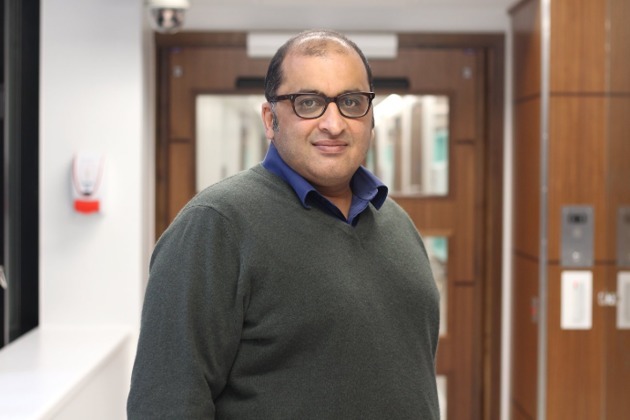In a white laboratory, a young doctor carefully adds a specific chimeric antigen receptor (CAR) gene to T cells extracted from white blood cells. These modified T cells, called CAR T cells, are then placed in a lab to grow and multiply until they are converted into "super soldiers" that can identify and destroy cancer cells.
This is CAR-T therapy, a revolutionary cancer treatment method that uses gene engineering technology to modify a patient's own immune cells. It has brought new hope to countless patients with blood cancers. Since 2017, the U.S. Food and Drug Administration (FDA) has approved six CAR T-cell products for the treatment of patients with advanced or relapsed blood cancers. Gilead Sciences' Yescarta had sales of $391 million in the third quarter of 2023, a 23% increase from the previous year.

Photo/UCL website
Last year, University College London (UCL) and Great Ormond Street Hospital (GOSH) treated a 13-year-old patient with relapsed T-cell leukaemia with base editing CAR T cells. This was the first time base editing had been used in CAR T-cell therapy, and the base editing technology was developed by a research team led by Waseem Qasim.

Photo/UCL website
The treatment was successful. The boy's leukemia went into remission within a few weeks, and he is now doing well, said Waseem Qasim. "Engineered T cells are living drugs that can not only enter tissues, but also track and kill cancer cells that have escaped other treatments. This makes them a promising new treatment for the most difficult blood cancers."
However, NBD found that one of the challenges facing CAR-T therapy is the dysfunction of T cells, including cell exhaustion or aging, which can reduce their efficiency after they enter the body.
For example, CAR T cells can also proliferate uncontrollably when infused into the patient's body, leading to potentially life-threatening inflammation and toxicity. In addition, allogeneic CAR-T cells also pose a higher risk of safety, such as immune rejection and graft-versus-host disease (GVHD).
It is worth noting that on November 28, 2023, the FDA announced that it had received 19 reports of patients developing a type of T-cell lymphoma after receiving CAR-T therapy. The FDA said that all CAR-T therapies targeting BCMA and CD19 have the risk of causing T-cell lymphoma. The agency is investigating the related risks and is evaluating whether regulatory action is necessary.
Baylor College of Medicine's Cell and Gene Therapy Center CAR-T expert Maksim Mamonkin said that in clinical trials, secondary cancer is "definitely not common, and it's not what we expect. But when it's used in commercial products for thousands of patients, it could be an occasional problem." He explained that T-cell lymphoma can occur in patients after receiving chemotherapy or other cancer treatments. If pre-cancerous cells are inadvertently collected during a bone marrow transplant, they could be used in CAR-T therapy, leading to secondary cancer.
In addition to the above risk factors, Waseem Qasim, a professor of cell and gene therapy at University College London, told NBD that "cost, time and the need for specialized laboratories are the main barriers to its wider adoption. However, it is expected that new technologies that emerge in the future may help to address some of these challenges."
It takes a long time to extract T cells from each patient, engineer the cells, expand them, and infuse them. This means that patients have to wait a long time for treatment. In addition, this process requires specialized facilities, and scientific and logistical support.
These limitations also mean that this therapy is extremely expensive. For example, the cost of a single Novartis CAR-T cell therapy is $475000 (approximately RMB 3.3 million).
According to data from medical market research publisher Kalorama Information, the global cell and gene therapy market raised $27 billion in the first three quarters of 2023, with a focus on T-cell therapies (CAR-T, TCR-T, TIL), NK cell therapies, and other areas. There are already over 1,500 companies involved in this field, with the most active companies including Oxford BioMedica, Astellas Pharma, Takeda Pharmaceutical, Eli Lilly, Bristol-Myers Squibb, and Novartis.
The Chinese CAR-T cell therapy market is expected to grow significantly in the coming years. According to a report by Frost & Sullivan, the market is expected to reach $4 billion by 2030.
Experts at Memorial Sloan Kettering Cancer Center believe that the next frontier for CAR-T cell therapy is in the treatment of solid tumors, such as lung cancer, kidney cancer, and bone cancer.
Although there is still much work to be done, researchers are optimistic about the future of CAR-T cell therapy in solid tumors. “We have seen some very encouraging results, such as successful transport and penetration into (solid) tumors, as well as significant objective responses noted in selected patients,” said Samer Srour, a professor of stem cell transplantation at MD Anderson Cancer Center at the University of Texas. “This again confirms the applicability of CAR-T cells in solid tumors and provides proof of concept.”
Cassim believes that it may take longer to make the same methods applicable to more complex cancers, and some of them may be combined with drugs or chemotherapy.
However, as a representative of cell therapy, the brilliant future of CAR-T therapy may not be far away.


 川公网安备 51019002001991号
川公网安备 51019002001991号





